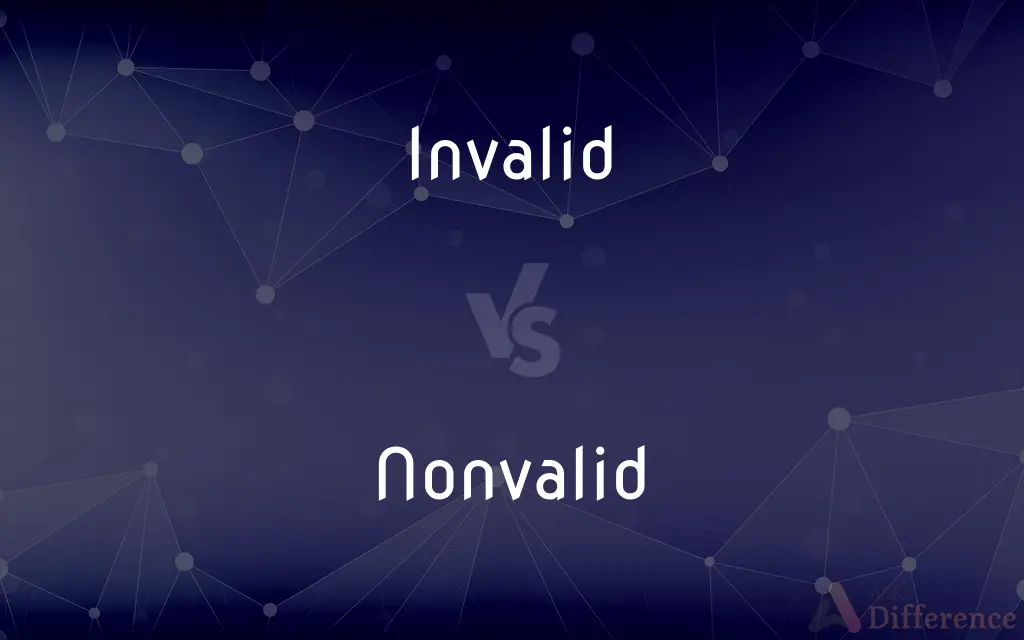Invalid vs. Nonvalid — What's the Difference?
By Tayyaba Rehman — Updated on October 30, 2023
Invalid refers to something lacking legal or logical correctness, while Nonvalid, less commonly used, means not adhering to established rules or standards.

Difference Between Invalid and Nonvalid
Table of Contents
ADVERTISEMENT
Key Differences
Invalid is a term widely used to describe something that is not legally or logically sound. It often implies a lack of legitimacy or correctness in various contexts, like arguments, documents, or processes. Nonvalid, on the other hand, is a less commonly used term that means not valid or not conforming to accepted standards or rules. It carries a similar implication but is not as prevalent in everyday language.
In legal contexts, invalid is frequently employed to denote contracts, documents, or actions that lack legal force or effect. It suggests non-compliance with legal requirements or principles. Nonvalid, while conveying a similar meaning, is not as prominently used in legal discourse. It also indicates non-conformity but lacks the specific legal connotations often associated with invalid.
In logical arguments or reasoning, a statement or conclusion can be termed invalid if it doesn't follow logically from the premises. Invalidity in this context relates to logical structure and coherence. Nonvalid, although it can be used in a similar sense, is less specific and more general in indicating something that doesn't meet established criteria or norms.
Invalid also has a medical connotation, referring to someone who is too ill to care for themselves. This meaning is unique to invalid and is not shared by nonvalid. Nonvalid, by contrast, is strictly used to denote the lack of validity in a more general sense, without these additional connotations.
In summary, invalid is a more versatile and widely used term with specific applications in legal, logical, and medical contexts, while nonvalid is less common and more general, primarily indicating that something does not adhere to established standards or norms.
ADVERTISEMENT
Comparison Chart
Common Usage
Widely used in legal, logical, and medical terms.
Less commonly used, more general.
Legal Implications
Often denotes lack of legal force.
Less specific to legal contexts.
Logical Context
Used to describe logical fallacies.
Can be used similarly, but less specific.
Additional Connotations
Can mean too ill to care for oneself.
Lacks this medical connotation.
Specificity
More specific in application.
More general in indicating non-conformity.
Compare with Definitions
Invalid
Not legally or officially acceptable.
The contract was declared invalid due to missing signatures.
Nonvalid
Not officially or legally acceptable.
The evidence was deemed nonvalid in court.
Invalid
Logically flawed or unsound.
His argument was invalid because the conclusion didn't follow from the premises.
Nonvalid
Not conforming to accepted rules or standards.
His membership was nonvalid since it had expired.
Invalid
Someone too sick to care for themselves.
After the accident, he became an invalid and required constant care.
Nonvalid
Not meeting the required norms.
The procedure was nonvalid because it deviated from the protocol.
Invalid
Not strong or sound; weak.
The old bridge was invalid and needed reinforcement.
Nonvalid
Lacking logical or sound basis.
Her conclusion was nonvalid due to faulty data.
Invalid
One who is incapacitated by a chronic illness or disability.
Nonvalid
Not effective or binding.
The agreement was nonvalid without both parties' signatures.
Invalid
Incapacitated by illness or injury.
Nonvalid
Not valid.
Invalid
Of, relating to, or intended for invalids.
Invalid
Not legally or factually valid; null
An invalid license.
Invalid
Falsely based or reasoned; faulty
An invalid argument.
Invalid
To incapacitate physically.
Invalid
Chiefly British To release or exempt from duty because of ill health
"I was not quite sick enough to be invalided out, even though I was of no more use" (Mary Lee Settle).
Invalid
Not valid; not true, correct, acceptable or appropriate.
Your argument is invalid because it uses circular reasoning.
This invalid contract cannot be legally enforced.
Invalid
Suffering from disability or illness.
Invalid
Intended for use by an invalid.
Invalid
Any person with a disability or illness.
Invalid
A person who is confined to home or bed because of illness, disability or injury; one who is too sick or weak to care for themselves.
Invalid
(archaic) A disabled member of the armed forces; one unfit for active duty due to injury.
Invalid
To exempt from (often military) duty because of injury or ill health.
He was invalided home after the car crash.
Invalid
(transitive) To make invalid or affect with disease.
Invalid
Of no force, weight, or cogency; not valid; weak.
Invalid
Having no force, effect, or efficacy; void; null; as, an invalid contract or agreement.
Invalid
Not well; feeble; infirm; sickly; as, he had an invalid daughter.
Invalid
A person who is weak and infirm; one who is disabled for active service; especially, one in chronic ill health who is unable to care for himself.
Invalid
To make or render invalid or infirm.
Invalid
To classify or enroll as an invalid.
Peace coming, he was invalided on half pay.
Invalid
Someone who is incapacitated by a chronic illness or injury
Invalid
Force to retire, remove from active duty, as of firemen
Invalid
Injure permanently;
He was disabled in a car accident
Invalid
Having no cogency or legal force;
Invalid reasoning
An invalid driver's license
Invalid
No longer valid;
The license is invalid
Invalid
Nullified or rendered void.
The ticket was invalid because it was for a past event.
Common Curiosities
How is nonvalid used?
Nonvalid is used to indicate that something doesn't conform to accepted rules or standards.
Can invalid be used in legal contexts?
Yes, invalid is commonly used to denote legal non-compliance.
What does it mean when an argument is invalid?
It means the argument has logical flaws or the conclusion doesn't logically follow.
What does invalid mean?
Invalid means lacking legal or logical correctness, or not strong or sound.
Are invalid and nonvalid interchangeable?
They can be in some contexts, but invalid has more specific connotations.
Is nonvalid common in legal language?
No, nonvalid is less common in legal contexts.
Is invalid more commonly used than nonvalid?
Yes, invalid is more commonly used.
What's a medical usage of invalid?
It can refer to someone who is too ill to care for themselves.
Can a contract be invalid?
Yes, if it doesn't meet legal requirements.
Does nonvalid have a medical connotation?
No, nonvalid doesn't have a medical connotation.
Which term is more versatile, invalid or nonvalid?
Invalid is more versatile and widely used.
Can invalid imply weakness?
Yes, it can imply something is not strong or sound.
Can nonvalid be used for logical arguments?
Yes, but it's less specific and less common than invalid.
Does nonvalid imply illegality?
Not necessarily; it implies non-conformity to standards or norms.
Can a contract be nonvalid?
Yes, but this usage is less common.
Share Your Discovery

Previous Comparison
Forever vs. Forevermore
Next Comparison
Inverse vs. ObverseAuthor Spotlight
Written by
Tayyaba RehmanTayyaba Rehman is a distinguished writer, currently serving as a primary contributor to askdifference.com. As a researcher in semantics and etymology, Tayyaba's passion for the complexity of languages and their distinctions has found a perfect home on the platform. Tayyaba delves into the intricacies of language, distinguishing between commonly confused words and phrases, thereby providing clarity for readers worldwide.
















































